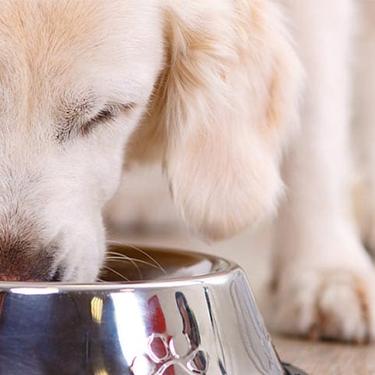
-
Find the right food for your pet
Take this quiz to see which food may be the best for your furry friend.
Find the right food for your pet
Take this quiz to see which food may be the best for your furry friend.
Featured products
 Small & Mini Savory Stew with Chicken & Vegetables Dog Food
Small & Mini Savory Stew with Chicken & Vegetables Dog FoodA delicious complement to the nutrition of Science Diet Small & Mini 7+ dog food
Shop Now Adult Healthy Cuisine Roasted Chicken, Carrots & Spinach Stew Dog Food
Adult Healthy Cuisine Roasted Chicken, Carrots & Spinach Stew Dog FoodDelicious roasted chicken paired with tender vegetables in a succulent stew
Shop Now Adult 7+ Perfect Digestion Chicken, Whole Oats & Brown Rice Recipe Dog Food
Adult 7+ Perfect Digestion Chicken, Whole Oats & Brown Rice Recipe Dog FoodScience Diet's breakthrough nutrition supports ultimate digestive well-being & healthy microbiome for dogs age 7+
Shop NowFeatured products
 Adult 7+ Senior Vitality Chicken & Vegetable Stew Cat Food
Adult 7+ Senior Vitality Chicken & Vegetable Stew Cat FoodImproves Everyday Ability to Get Up & Go
Shop Now Adult Savory Entrée Can Variety Pack Cat Food
Adult Savory Entrée Can Variety Pack Cat FoodPrecisely balanced nutrition with the delicious taste of savory minced chicken to help fuel the energy needs of cats during the prime of their life
Shop Now Adult 7+ Tender Tuna Dinner Cat Food
Adult 7+ Tender Tuna Dinner Cat FoodWith delicious chunks in a decadent gravy
Shop Now -
Dog
- Dog Tips & Articles
-
Health Category
- Weight
- Food & Environmental Sensitivities
- Urinary
- Digestive
- Joint
- Kidney
-
Life Stage
- Puppy Nutrition
- Adult Nutrition
- Senior Nutrition
Cat
- Cat Tips & Articles
-
Health Category
- Weight
- Skin & Food Sensitivities
- Urinary
- Digestive
- Kidney
-
Life Stage
- Kitten Nutrition
- Adult Nutrition
Featured articles
 Do Dogs and Cats have Belly Buttons?
Do Dogs and Cats have Belly Buttons?Learn whether cats & dogs have belly buttons like humans, what the function is, and if there are any health concerns associated with it.
Read More Does My Pet Hate Me?
Does My Pet Hate Me?Learn tips for bonding with your pet if you've ever thought, 'My dog doesn't like me, or 'Why do I have a standoffish cat?'
Read More Why Are Dogs and Cats So Cute?
Why Are Dogs and Cats So Cute?If waggy puppy dog tails and furry kitten yawns make you swoon, you're not alone. Why are cats so cute? And, dogs too! Let's find out!
Read More -


You adore your dog, so naturally you want them to live as long as possible. For many pet parents, this line of thinking often leads to researching how to compare dog years to human years. Understanding a dog's age in human years can help put things into perspective — but is there a reliable way to do it? An old saying asserts one dog year equals seven human years. However, modern research shows converting dog years to people years is more complex.
Read on for a deep dive into dog lifespans, including the life expectancy of large dogs versus small dogs, ways to compare dog years and people years, and tips to help your dog live the longest, best life possible.
A Dog's Lifespan: What to Expect
Many factors can affect a dog's lifespan, from size to nutrition. Here are some of the key influential factors.

Breed Size
Comparing large dog years to human years is different than comparing small dog years to human years. This is because, in general, small dogs live longer than large dogs.
Large dogs may age faster due to the strain their size puts on their bodies. For example, larger dogs are at higher risk of arthritis due to more wear and tear on their joints. Another theory suggests large dogs are more susceptible to cancer than small dogs due to their rapid growth.
When Dogs Become Seniors by Size
While science is still trying to uncover the exact reasons, the American Veterinary Medical Association provides some rough estimates for when different-sized dogs become seniors, meaning they've reached the last 25% of their breed's estimated lifespan:
Small or toy breeds (less than 20 pounds): 8 to 11 years
Medium-sized breeds (20 to 50 pounds): 8 to 10 years
Large breeds (50 to 90 pounds): 8 to 9 years
Giant breeds (more than 90 pounds): 6 to 7 years


Tasty Tips
Other Factors
When considering your dog's lifespan based on their size, remember "averages" are general observations, and other factors are at play. For example, Labrador retrievers (a large breed) can live over 13 years with the right care and supporting circumstances.
Here are some other factors that can affect a dog's lifespan:
Genetics
Face shape (brachycephalic breeds are prone to respiratory issues)
Chronic disease or parasites
Weight (lean dogs tend to live longer than overweight dogs)
Nutrition
Veterinary care
How to Compare Canine Years to Human Years
You may have heard of the "7:1 ratio" used to compare people years to dog years. This ratio is based on the assumption that the average dog lives to 10 and the average human lives to 70. However, we now know this ratio isn't reliable, especially when you consider how many factors affect lifespan. So, how do you calculate a dog's age, and can you compare dog years to human years?
A study comparing dog and human genomes showed that, in terms of genetics, comparing dog years to people years is like comparing apples to oranges. Specifically, a young dog's genome changes much more rapidly than a young human's. The researchers found the comparison of dog years to human years is nonlinear at best, debunking the 7:1 ratio.

Converting People Years to Dog Years
As tempting as it is, you can't accurately calculate a dog's lifespan in human years. If you want to try it anyway, the American Kennel Club provides these guidelines to estimate a medium-sized dog's age in human years:
Year one of a dog's life equals 15 human years.
Year two equals about nine human years.
Each human year equals approximately five dog years after that.
How to Help Your Dog Live Longer
While you can't control your dog's size and genetics, you can improve their chances of living a long, healthy life by prioritizing the following:
Complete and balanced nutrition
Regular veterinary wellness care, including parasite control, exams and vaccinations
Dental care, including at-home and professional cleanings
Daily exercise and mental stimulation
Your Dog's Best Life
The best way to think about your pup's lifespan is the age of a dog in dog years. It can be tempting to get wrapped up in a dog's age in human years, but that isn't what will help your dog live long or live well. Feeding your dog the right amount of high-quality food, taking them in for regular veterinary care, and providing daily exercise and attention go a long way toward your pup's health and happiness.



Dr. Sarah Wooten graduated from UC Davis School of Veterinary Medicine in 2002. A member of the American Society of Veterinary Journalists, Dr. Wooten divides her professional time between small animal practice in Greeley, Colorado, public speaking on associate issues, leadership, and client communication, and writing. She enjoys camping with her family, skiing, SCUBA, and participating in triathlons.
Related products
Related articles

Proper nutrition for your pregnant or nursing dog is vital to her and her puppy's health. Learn what you should do provide her with the proper nutrients.

Learn how today's wet dog food blends have gotten a face lift, and how you'll provide your dog the nutrition he needs in the form he loves.

Learn about choosing the right dog food to help ensure your adult dog will receive the correct balance of nutrition.

Learn the the dangers of feeding your dog chocolate, which types are most dangerous, and what to do if you discover that they have consumed chocolate.

Put your dog on a diet without them knowing
Our low calorie formula helps you control your dog's weight. It's packed with high-quality protein for building lean muscles, and made with purposeful ingredients for a flavorful, nutritious meal. Clinically proven antioxidants, Vitamin C+E, help promote a healthy immune system.
Put your dog on a diet without them knowing
Our low calorie formula helps you control your dog's weight. It's packed with high-quality protein for building lean muscles, and made with purposeful ingredients for a flavorful, nutritious meal. Clinically proven antioxidants, Vitamin C+E, help promote a healthy immune system.

